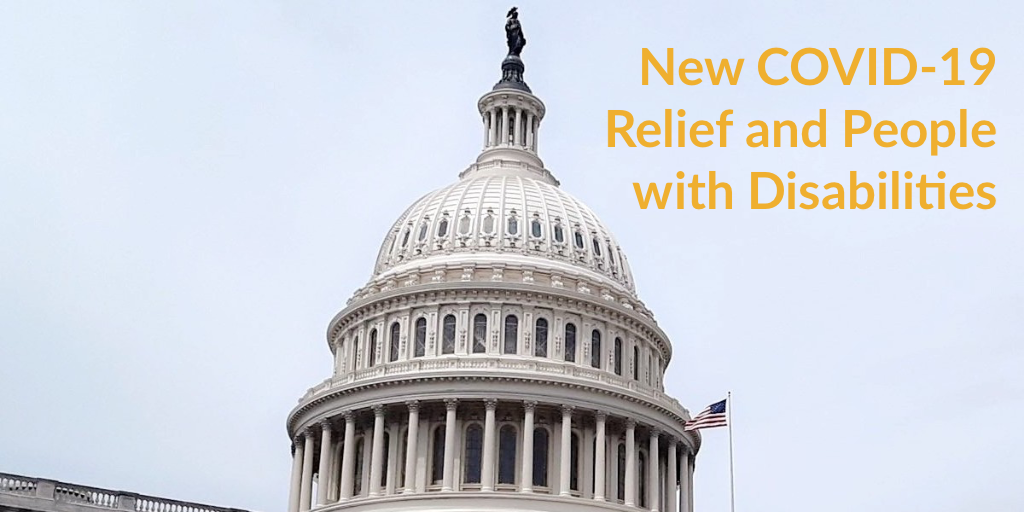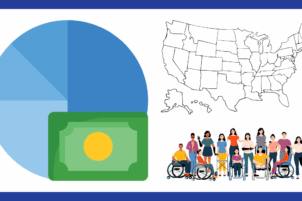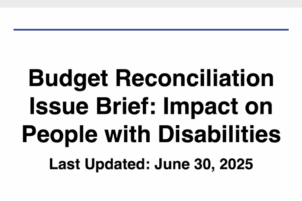The new $900 billion stimulus bill promises more stimulus checks, extends unemployment supports and impacts everything from businesses to schools.
 Washington, D.C., Dec. 22 – After months of partisan gridlock and inaction, the Congress finally approved a massive coronavirus relief bill last night and sent it to the President’s desk. This mammoth bill, totaling more than 5,000 pages of legislative language and with more than $900 billion in spending, becomes law at the same time as the United States crosses the grim milestone of more than 316,000 dead because of the pandemic.
Washington, D.C., Dec. 22 – After months of partisan gridlock and inaction, the Congress finally approved a massive coronavirus relief bill last night and sent it to the President’s desk. This mammoth bill, totaling more than 5,000 pages of legislative language and with more than $900 billion in spending, becomes law at the same time as the United States crosses the grim milestone of more than 316,000 dead because of the pandemic.
New, But Smaller Checks for Individuals With and Without Disabilities:
The new bill does include a new round of stimulus checks to be sent directly to millions of Americans with and without disabilities. This new, smaller check will be a one-time cash payment sent from the government to all U.S. residents with adjusted gross income up to $87,000 ($174,000 if you are married) and each dependent child under age 17.
As was the case earlier this year, this will explicitly exclude approximately 13.5 million adult dependents who include high school or college students living at home and millions of people with disabilities. This is a major disappoint for many activists, given past bipartisan support to expand support for adult dependents.
Likewise, because this stimulus check is considered a rebate, it will NOT be counted against the asset limits faced by people with disabilities if spent within 12 months of receipt. However, people with disabilities who are on Supplemental Security Income (SSI) will have to file their taxes. This could create a major burden for many of the poorest people with disabilities and other low-income communities, many of whom may find access to filling out the forms a challenge.
Continued Unemployment Insurance Support for Workers Impacted by COVID:
Beyond the death toll of COVID-19, millions of Americans with and without disabilities have been impacted by the economic crisis created by the pandemic. According to the latest statistics, more than 20 million Americans are out of work and depend on some form of unemployment support. This includes thousands of workers with disabilities who have been directly impacted by lockdowns and business closures.
The CARES Act, the previous stimulus bill passed back in March, created the Pandemic Unemployment Assistance and Pandemic Unemployment Emergency Compensation programs. Both programs were scheduled to end later this month but will now be extended to March 14, 2021. Thanks to the stimulus, the federal government will continue to offer a supplement of $300 more dollars per week for unemployment benefits. These benefits will be implemented beginning on December 27, 2020.
Thousands of Americans with and without disabilities are struggling to find new work, retrain their skills or even just survive the current economic crisis. Earlier this month, 885,000 out-of-work Americans applied for first-time unemployment benefits and workers with disabilities saw their labor-force participation rate drop to 33.6 percent in November 2020.
If you have lost your job and need to file for Unemployment Insurance, please contact your state unemployment agency HERE.
To download a free copy of RespectAbility’s guide on how to find jobs during the pandemic, go HERE.
$13 Billion Dollars to Support Millions of Americans Facing Hunger:
With so many people out of work, millions of Americans are worried about how to put food on the table. Fortunately, the new stimulus bill includes $13 billion dollars in federal spending to support increased access to the Supplemental Nutrition Assistance Program (SNAP, formerly the Food Stamp Program). All SNAP beneficiaries will see a 15 percent increase in their benefits through June 30, 2021. In addition, unemployment compensation will no longer be counted to determine SNAP eligibility, college students will now be able to qualify, and states will receive $100 million dollars to handle additional administrative burdens.
Nationwide, 11 million Americans with disabilities depend on SNAP to put food on their tables. When the pandemic hit, they were suddenly forced to choose between feeding their families and being exposed to a deadly virus. Since the pandemic started, the United States Department of Agriculture (USDA) has progressively expanded the number of states where SNAP users can use their benefits to order groceries online. The SNAP Online Purchasing Pilot now extends to 47 states and covers 90 percent of SNAP-eligible households.
Critically, the new stimulus bill includes money specifically earmarked to ensure that additional retailers can participate in online SNAP purchasing. Previously, only Amazon Fresh, Walmart and a limited number of local stores were authorized retailers.
To apply for SNAP benefits, you need to contact your state SNAP program or agency HERE.
Housing Protections and Small Business/Nonprofit Supports:
More than 8 million Americans have fallen into poverty since the pandemic began. That stark reality is clearest when you look at access to housing. Between 30 and 40 million Americans are at risk of eviction and advocacy organizations have been calling for support since the crisis began. The new stimulus bill includes $25 billion dollars in tax-free rental assistance and changes the funding formula for the Low-Income Housing Tax Credit program, which helps build more affordable housing units. The housing provisions of the bill also extend an eviction moratorium through till January 31, 2021.
For access to housing resources and other information, please visit the Department of Housing and Urban Development’s state agency directory HERE.
Small businesses will once again have the opportunity to seek support through the Paycheck Protection Program (PPP). Approximately $300 billion have been allocated for the PPP version 2.0 and will now include expanded eligibility for nonprofit organizations.
As the new PPP program is rolled out, look for further updates from the Small Business Administration HERE.
For nonprofit disability organizations or agencies looking to participate in the PPP, please find SBA’s nonprofit resources HERE.
New Funding for Students, Families, and Schools:
The world of education has been radically transformed by the COVID-19 pandemic and the switch to virtual learning. As such, the stimulus bill also includes specific provisions to support students, teachers, schools, colleges and universities. In the new bill, $22.7 billion has been dedicated to meeting the needs of colleges and universities while $54.3 billion has been set aside to support K-12 schools. Unfortunately for student loan borrowers, the moratorium on loan payments included in the original stimulus bill has not been extended. On the positive side, given how many families now depend on internet access to ensure their child’s education, the stimulus includes $7 billion dollars to expand broadband services. One final piece of good news for working families, this bill does include $10 billion dollars in funding for child care services.
For resources specific to students with disabilities, please see RespectAbility’s newly updated Virtual Education & Students with Disabilities: Supporting Student Success in the Time of COVID-19 and Beyond guide online HERE.
Would you like to know more?
You can learn more about the contents of the stimulus bill by reading the text itself directly at https://www.cnn.com/2020/12/21/politics/new-covid-stimulus-bill-text/index.html.
This bill would not have happened were it not for the activism of dozens of advocacy organizations and hundreds of actively engaged citizens with and without disabilities. To contact your members of Congress, RespectAbility encourages people to use our Voter Voice tool to engage in digital advocacy: https://www.votervoice.net/ RespectAbility/campaigns/78838/respond or read the latest headlines about the intersection of disability and politics on our blog here: https://therespectabilityreport.org.
Lastly, if you would like to know more about how COVID-19 is impacting the disability community, we encourage you to review and make use of the following resources and materials:








Unemployed get $300. Extra $ to live but people living on SSI who can’t even afford rent get no extra help weekly or monthly?? Just a one time stimulus as everyone else but these people also receive a ton of food stamps and extra $ weekly, so why are SSI recipients the lowest & still suffering when their disabled?
I am really surprised how single people under retirement age unemployed with no dependents, is only given the minimum of support from the stimulus package. Disability check my only income and under $9,000.00 annually. Woe is me!. We are unrepresented in Congress.
My question is can you help me gain unemployment with training for people with disabilities. I been out of work force for over 20 years basically. My email address (hallwilliamse@gmail.com). Thank you!